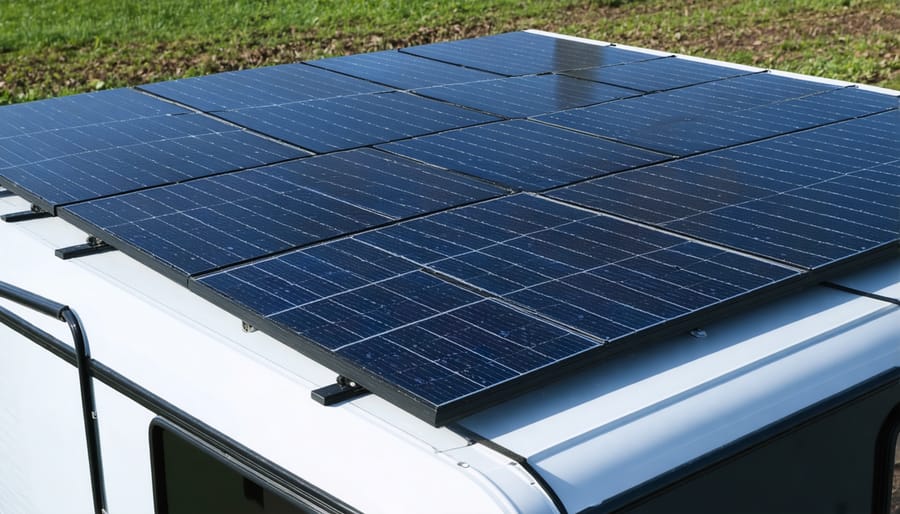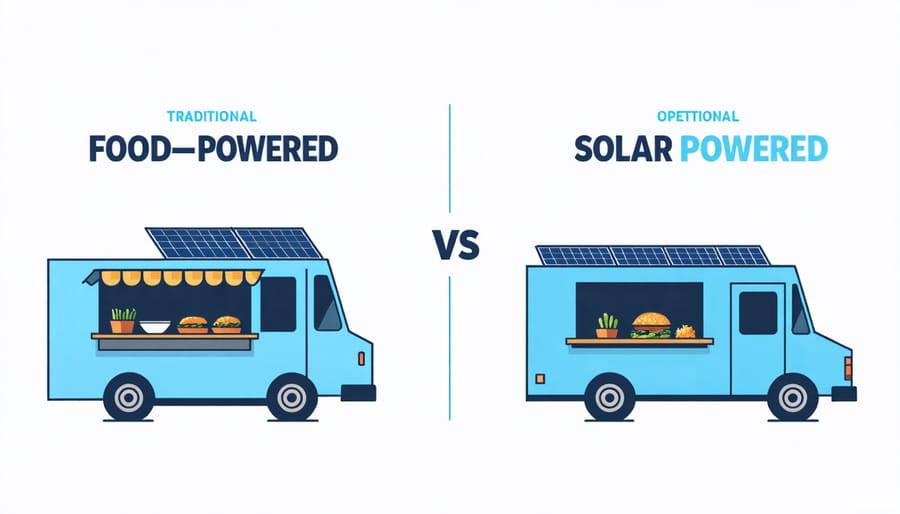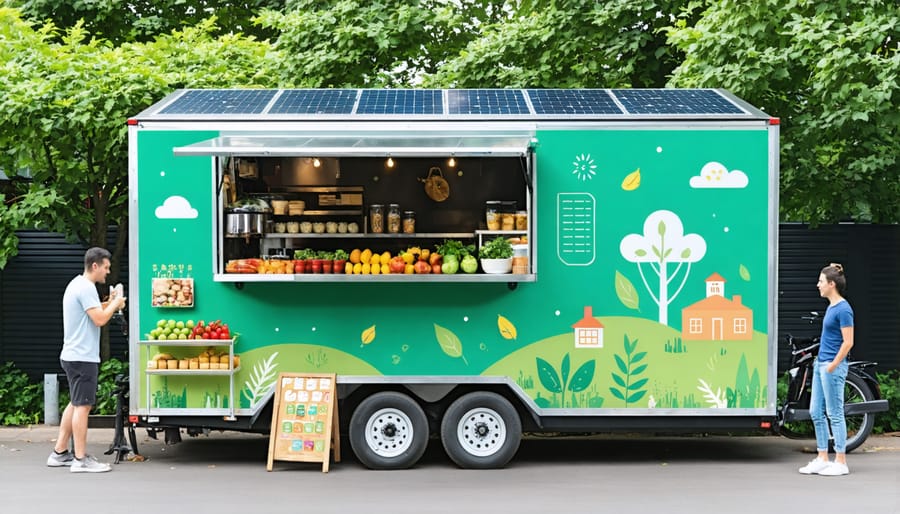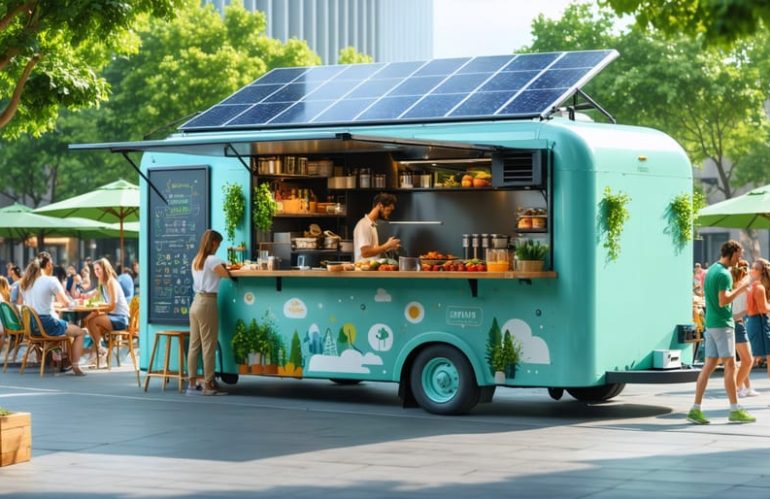The solar-powered food truck revolution is transforming street cuisine by combining culinary innovation with sustainable energy. As solar-powered mobile vehicles gain momentum, food truck operators are discovering a powerful way to slash operating costs while attracting eco-conscious customers. By harnessing free energy from the sun, these mobile kitchens eliminate noisy generators, reduce carbon emissions, and maintain reliable power for refrigeration, cooking equipment, and point-of-sale systems. Modern solar solutions now deliver enough power to run commercial-grade appliances throughout a busy service day, while excess energy stored in advanced battery systems ensures uninterrupted operation during cloudy weather. For food truck entrepreneurs, this sustainable upgrade represents more than environmental responsibility – it’s a smart business decision that cuts fuel costs, reduces maintenance needs, and creates a compelling marketing advantage in today’s green-conscious marketplace.
How Solar Power Transforms Food Truck Operations
Essential Solar Components for Food Trucks
A successful solar-powered food truck relies on three key components working in harmony. High-efficiency solar panels, typically monocrystalline or polycrystalline, are mounted on the truck’s roof to capture sunlight and convert it into usable electricity. Most food trucks require between 1.5 to 3 kW of solar panels, depending on their energy needs.
Deep-cycle lithium batteries form the heart of the storage system, allowing trucks to operate during cloudy days or after sunset. These batteries are more compact and efficient than traditional lead-acid alternatives, making them ideal for mobile applications. A typical setup includes 200-400Ah of battery capacity to power essential equipment throughout the day.
The power management system ties everything together, consisting of charge controllers and inverters. Charge controllers regulate the power flow from panels to batteries, preventing overcharging and extending battery life. Pure sine wave inverters convert stored DC power to AC power, ensuring smooth operation of kitchen equipment. Smart monitoring systems help owners track energy production and consumption in real-time, allowing for optimal power management.
This integrated system provides reliable, sustainable power while reducing operational costs and environmental impact.

Power Requirements and Solar Solutions
A typical food truck requires substantial power to operate its essential equipment, including refrigerators, griddles, fryers, and lighting systems. On average, a food truck consumes between 3,000 to 5,000 watts during peak operations. This significant energy demand has traditionally been met through generators or shore power connections, but modern solar-powered utility systems now offer a sustainable alternative.
A well-designed solar setup for a food truck usually consists of 6-12 high-efficiency panels mounted on the roof, capable of generating 2,000-3,600 watts of power. These are connected to deep-cycle batteries that store excess energy for use during cloudy days or evening operations. Most food truck owners opt for a hybrid system, combining solar power with a small backup generator to ensure uninterrupted service during extended periods of low sunlight.
The key to successful solar integration lies in energy-efficient appliance selection and smart power management. LED lighting, energy-star rated refrigeration units, and strategic scheduling of high-power equipment can help maximize the benefits of your solar investment while maintaining reliable operations throughout the day.
Financial Benefits of Going Solar

Operating Cost Reduction
Converting a food truck to solar power can significantly reduce daily operating costs. Traditional food trucks typically spend $25-40 per day on generator fuel, adding up to $9,000-14,000 annually. By integrating solar energy infrastructure, owners can eliminate most of these fuel expenses.
The savings extend beyond fuel costs. Solar-powered food trucks require less maintenance than generator-based systems, reducing annual maintenance expenses by approximately $800-1,200. Additionally, solar power eliminates the need for expensive generator repairs and replacements, which can cost upwards of $3,000 every few years.
Many food truck owners report breaking even on their solar investment within 2-3 years through combined savings on fuel, maintenance, and operational costs. Some operators have documented monthly savings of $400-600 on energy expenses alone. These savings become even more significant when considering rising fuel prices and increased environmental regulations in many cities.
Tax incentives and green business certifications can provide additional financial benefits, making solar power an increasingly attractive option for food truck entrepreneurs.
Available Incentives and Tax Benefits
Food truck owners can take advantage of several government incentives and tax benefits when investing in solar power systems. The federal Solar Investment Tax Credit (ITC) allows businesses to deduct 30% of their solar installation costs from their federal taxes through 2032. Many states offer additional tax incentives, grants, and rebates that can significantly reduce the initial investment.
Small business owners may qualify for USDA’s Rural Energy for America Program (REAP), which provides grants covering up to 25% of renewable energy project costs. Local utility companies often offer performance-based incentives or net metering programs, allowing food truck operators to earn credits for excess power generated during stationary periods.
Some cities and counties provide special permits or reduced fees for solar-powered food trucks, recognizing their contribution to environmental sustainability. Additionally, businesses can benefit from accelerated depreciation through the Modified Accelerated Cost Recovery System (MACRS), allowing them to recover their solar investment through tax deductions over five years.
These incentives, combined with reduced operating costs, can help food truck owners achieve a faster return on their solar investment while supporting sustainable business practices.
Environmental Impact and Marketing Advantage
Green Business Appeal
In today’s eco-conscious market, a solar-powered food truck serves up more than just meals – it delivers a powerful message about environmental responsibility. Customers increasingly seek out businesses that align with their values, and solar power demonstrates a clear commitment to sustainability. Food trucks utilizing solar energy often report increased customer engagement, with patrons expressing appreciation for the reduced carbon footprint and clean energy approach.
The visible solar panels act as a conversation starter, creating organic marketing opportunities and helping build a loyal customer base. Many truck owners find that highlighting their solar capabilities on social media and marketing materials resonates strongly with younger demographics and environmentally aware consumers. This green appeal can translate into a competitive advantage, especially in urban areas where sustainability is highly valued.
Additionally, the quiet operation of solar power, compared to traditional generators, creates a more pleasant dining experience while reinforcing the eco-friendly brand image.
Building a Sustainable Brand
Operating a solar-powered food truck offers a unique opportunity to build a strong, environmentally conscious brand that resonates with modern consumers. By prominently featuring your commitment to renewable energy, you can attract environmentally aware customers who actively seek sustainable dining options. Many food truck owners report that their solar installations become natural conversation starters, helping to create memorable experiences and strengthen customer relationships.
You can leverage your sustainable practices in marketing materials, social media, and local food events. Consider creating educational displays that show how your solar system works and the environmental impact it makes. This transparency helps build trust and demonstrates your commitment to sustainability. Many customers are willing to pay slightly more or travel further to support businesses that align with their values.
Partner with local environmental organizations and participate in green events to expand your reach and reinforce your eco-friendly brand identity. These connections often lead to catering opportunities and positive word-of-mouth marketing, helping your business grow while maintaining its sustainable focus.

Real Success Stories
Meet Sarah Chen, owner of “Green Bites,” a thriving Korean fusion food truck in San Francisco. In 2019, she transformed her conventional truck into a solar-powered marvel, installing a 2kW system that powers her refrigeration, lighting, and point-of-sale systems. “My monthly energy costs dropped from $400 to just $50,” Sarah shares. “Plus, customers love our eco-friendly approach – it’s become part of our brand identity.”
In Austin, Texas, the “Solar Slice” pizza truck demonstrates how solar power can support even energy-intensive cooking equipment. Owners Mike and Lisa Rodriguez installed a 3.5kW system with battery storage, allowing them to run their electric pizza oven during peak hours. Their investment paid off in just 18 months, and they’ve since expanded to a second solar-powered truck.
The “Sunshine Smoothies” truck in Miami showcases how solar power enables operation during power outages. During Hurricane Ian in 2022, owner David Martinez continued serving fresh smoothies when other food trucks were forced to close. “We became a community hub during the recovery period,” David recalls. “The solar system paid for itself in that week alone.”
In Portland, Oregon, “Farm to Solar” food truck collective demonstrates the scalability of solar power. Five trucks share a mobile solar array, reducing individual costs while maximizing environmental impact. The collective saves an estimated $25,000 annually in energy costs and has reduced their carbon footprint by 80%.
Perhaps the most impressive success story comes from Seattle’s “Volt Eats,” which operates entirely on solar power, even during the cloudy Pacific Northwest winters. Owner Rachel Thompson’s innovative design includes transparent solar panels on the awning and sophisticated battery storage. “We haven’t used grid power in two years,” Rachel proudly states. “Our system generates excess energy that we feed back to the grid when we’re parked at our depot.”
These success stories share common themes: significant cost savings, enhanced brand value, operational resilience, and positive environmental impact. They prove that solar-powered food trucks aren’t just environmentally responsible – they’re smart business investments that pay dividends in multiple ways.
Solar-powered food trucks represent a smart, sustainable evolution in mobile food service. By harnessing clean energy from the sun, food truck owners can significantly reduce their operating costs while demonstrating environmental leadership in their communities. The combination of reduced fuel expenses, lower maintenance costs, and potential tax incentives makes the switch to solar power an increasingly attractive option for food truck entrepreneurs. As cities worldwide embrace green initiatives and consumers become more environmentally conscious, solar-powered food trucks are positioned to lead the industry’s sustainable transformation. Making the switch not only benefits the planet but also creates a compelling competitive advantage in today’s eco-aware market. For food truck owners looking to future-proof their business while making a positive environmental impact, solar power represents an investment that pays dividends both financially and ethically.









